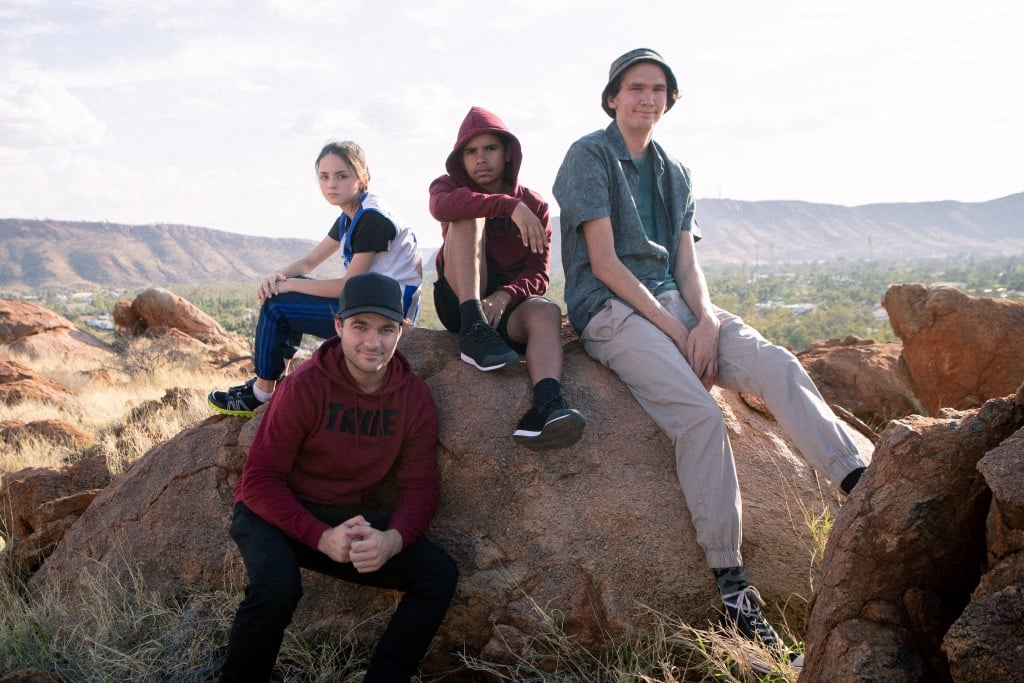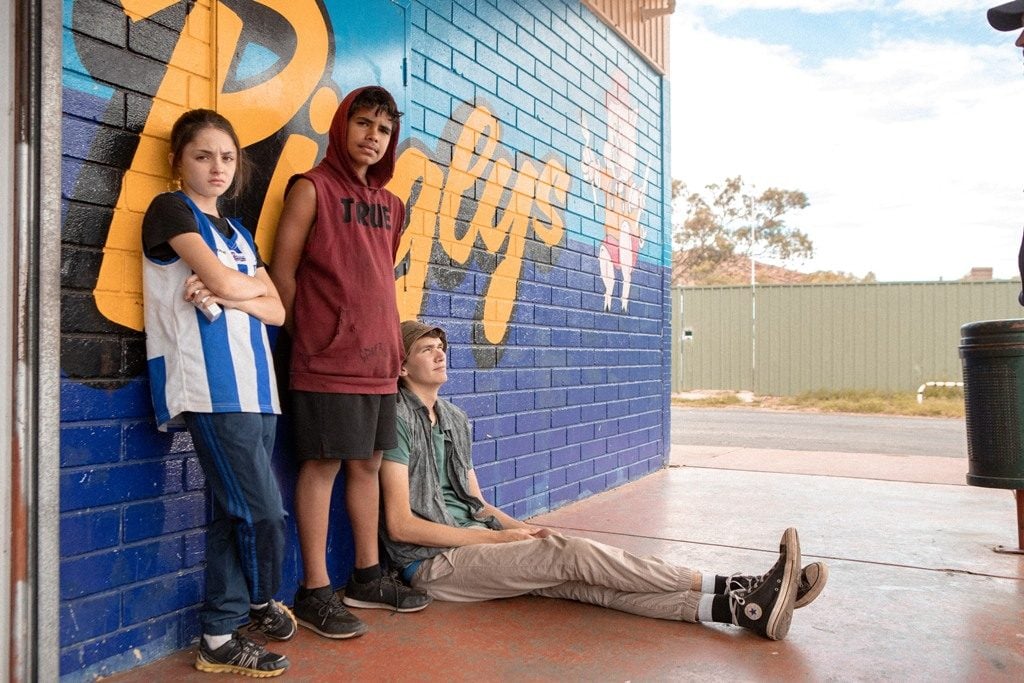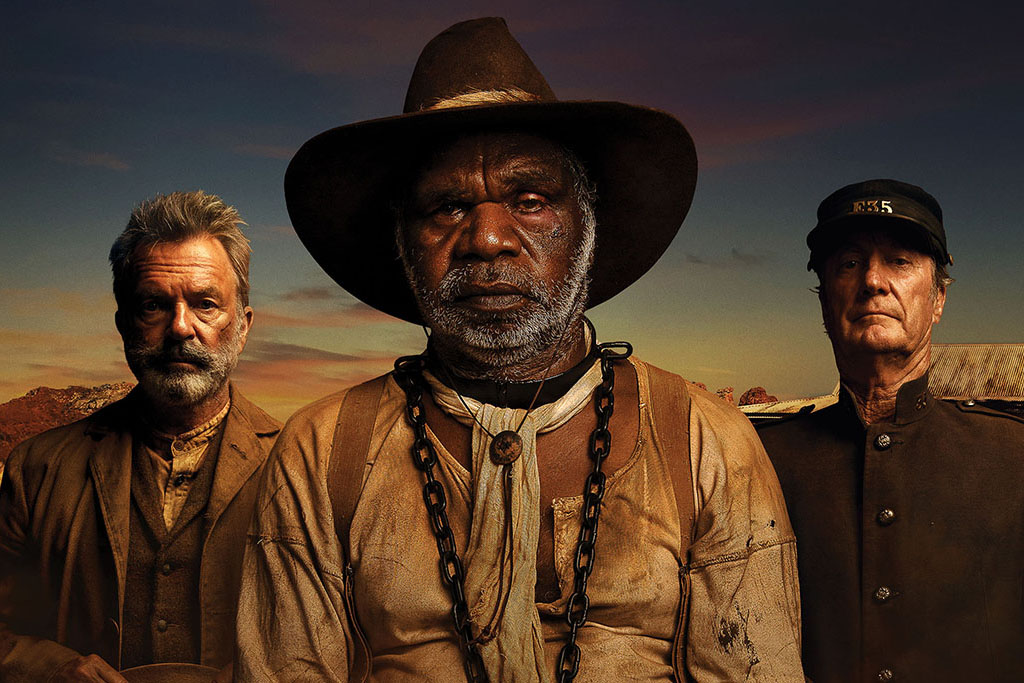Meet The Young Indigenous Storyteller Bringing Robin Hood To Alice Springs
With his new SBS series, Dylan River wants to challenge stereotypes and make people talk.

“I want people to walk away from things I make and not just go ‘oh that was fun’ and then not talk about it again,” says filmmaker Dylan River. “You want it to be brought up at the dinner table and for people to talk about it.”
It’s not surprising to hear River say this. He might only be 26, but in a lot of ways, it seems like he was born to tell stories that make people talk. The son of acclaimed director Warwick Thornton (Sweet Country, Samson and Delilah) and producer and former Screen Territory chief Penelope McDonald, River is part of a dynasty of incredible Indigenous storytellers that also includes his grandmother Freda Glynn, who founded the Central Australian Aboriginal Media Association (CAAMA) and Imparja TV, and his aunt Erica Glynn, a producer on Redfern Now and a director on Black Comedy.
Big shoes to fill, but River is already doing a hell of a job. He won the 2013 Sydney Film Festival Documentary Prize for his debut film Buckskin, while his 2015 short Nulla Nulla screened at the Berlin Film Festival. However, it’s his latest project — a six-part webseries that debuted on SBS On Demand last week — that really seems destined to generate conversation.
Set in River’s home town of Alice Springs, the sweet, funny, incisive show follows a cheeky kid named Robbie (Pedrea Jackson) as he gets into mischief with his two best mates, the foul-mouthed Georgia Blue (Jordan Johnson) and the comically tall Little Johnny (Levi Thomas). Robbie’s a good kid, although he’s not afraid to skirt the law if it means helping his community, his family or his friends. Hence the show’s title: Robbie Hood.
“It originally came from an actor who’s now passed away, Tom E. Lewis,” recalls River when I ask about the show’s origins. “I was doing a documentary with him a few years ago and he told me about a young fellow in his community that had stolen all the power cards from the local shop. Power cards are like credit for power in Aboriginal communities. The kid had stolen all the power cards and he gave them away to everyone in the community so they all had power … that’s a modern-day Robin Hood. From there, I got inspired by thinking about stories from Alice Springs and how I could create something out of this.”
Indeed, tales from Alice Springs, and from River’s own life, are much a source of inspiration as stories from Sherwood Forest. Take for example an incident in episode one where Robbie, Georgia and Johnny shoot a cow and then store the carcass in the bathtub at Robbie’s nan’s house.
“That’s something my uncle did back in the ’80s,” River explains. “He killed a cow and left it in my family’s shower. So those sorts of things are inspired by real life. A lot of things that I write come from real experiences, or docos, or something that I’ve seen.”
Of course, while the scene with the cow is funny (in a morbid sort of way), it also speaks to a darker truth: Robbie can’t afford to buy meat from the shops. Robbie Hood certainly isn’t afraid of depicting the tough realities of life in poor Indigenous communities, with the show touching on a number of confronting issues including racism, poverty and a dysfunctional foster care system. At the same time, River does a remarkable job of keeping each ten-minute episode entertaining and accessible — which is particularly important when you want young audiences to tune in.
“I hope that this show is being watched by adults with their kids, and they can talk about it afterwards,” River says. “That’s how we start conversations.”
“The primary goal,” he adds, “is for other Aboriginal kids like Robbie to watch it and see themselves on screen, to see that they’re not bad kids, that they do have good hearts and they do have good intentions.”
“I think it’s really important that we are creating characters that are universal, that are complex, and aren’t stereotypes. If we keep making films about the Indigenous kid that’s poor and sad and depressed, and the hard life lessons, then everyone’s going to think that every Aboriginal kid is poor and sad and depressed. Whereas Robbie, okay, he is poor, his life situation is challenging, but he’s really making the most of it and he’s optimistic.”
River’s desire to shatter stereotypes extends to his depiction of law enforcement. Where Robin had the ruthless Sheriff of Nottingham, Robbie has the kind-hearted Shane the Copper (Dan Falzon).
“To me, it was really important that the police weren’t portrayed in a bad light,” says River. “It was important that they were a supporting figure. They do a very hard job anywhere, but especially in the Northern Territory. The cop character ends up being really the only adult guiding figure for Robbie in his life, you know?”

Jordan Johnson, Pedrea Jackson and Levi Thomas in Robbie Hood.
Despite how it might seem, River says he doesn’t write with a particular message in mind. “I think when I write about Alice Springs or write about the topics we touch on [in Robbie Hood], it naturally becomes political and deals with big things. But it’s not…,” he pauses, searching for the words. “It’s hard to explain … a lot of the time when I write something, I usually figure out afterwards what it’s actually about. And then I start angling it further in that direction.”
Even if he doesn’t set out to be political, River’s a big believer in the power of film and television to shape public discourse.
“I’ve been touched by many films in my life,” he says. “When it’s truly put together well and saying something, it stays with you.”
“I was 15 when Samson and Delilah got released by my dad. As much as it was like, ‘oh, your dad’s making a film, that’s cool,’ it was seeing the reaction from the public and the way it sort of shaped Australia at that time, and the conversations it started, that really drove me to see the importance of what [my parents] do, more than it just being a job.”
“I definitely have tried to take that on board myself with everything I do,” he adds. “Make sure it’s entertaining, but [also] telling a story, a message, and trying to make change in some way.”
You can watch all six episodes of Robbie Hood on SBS On Demand.
